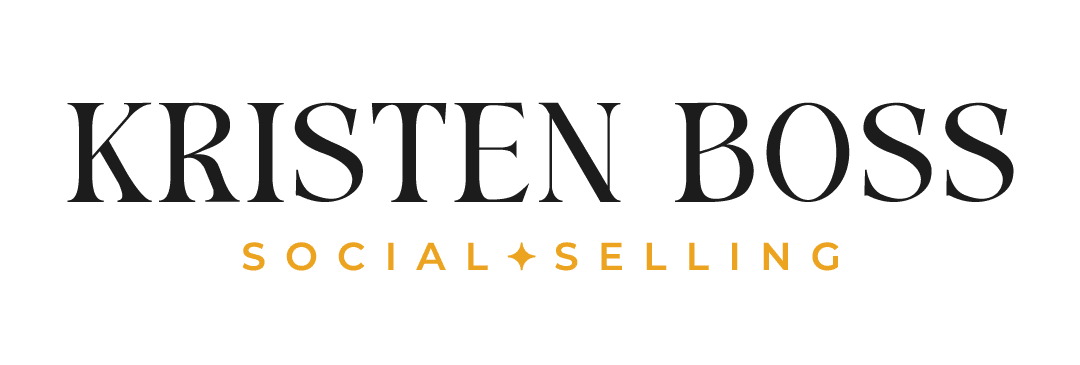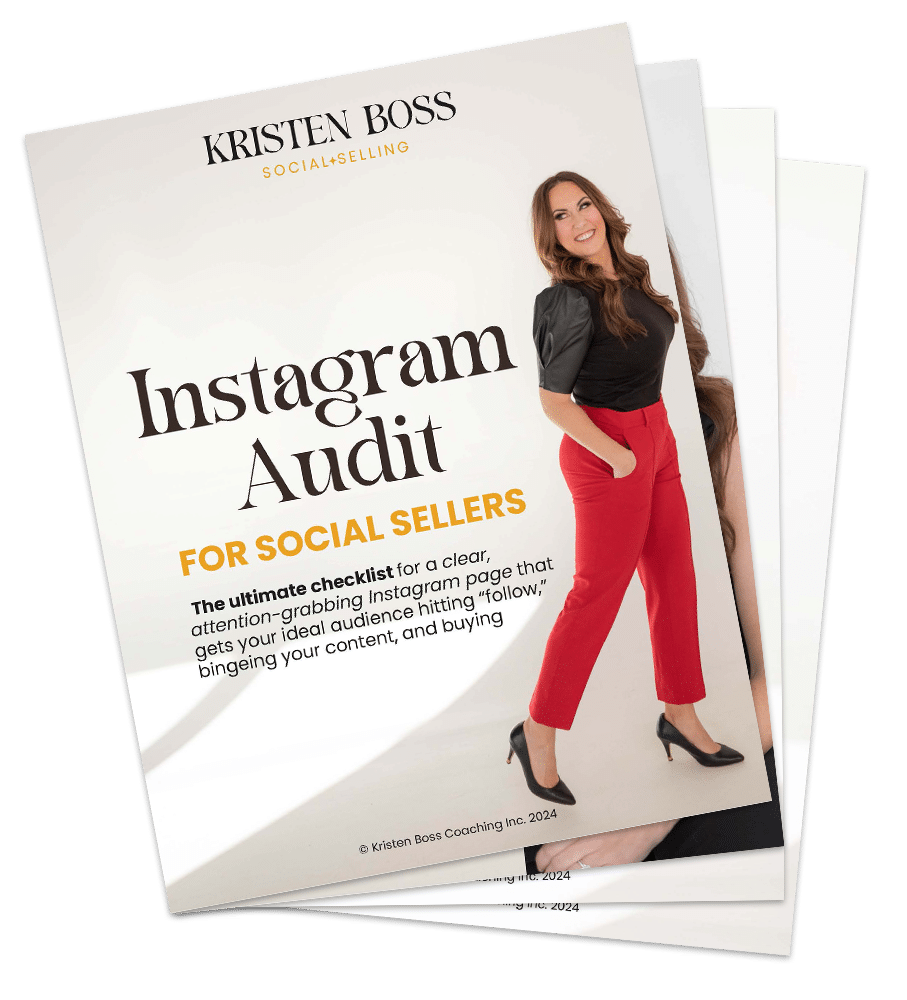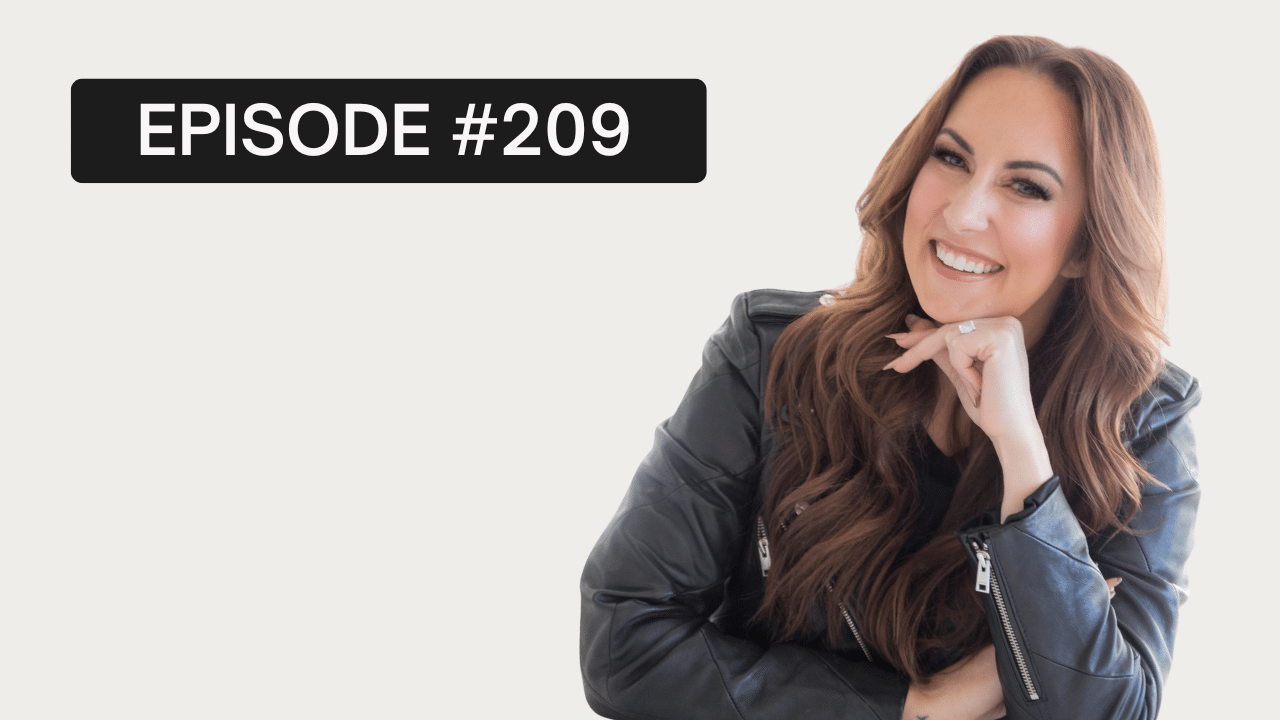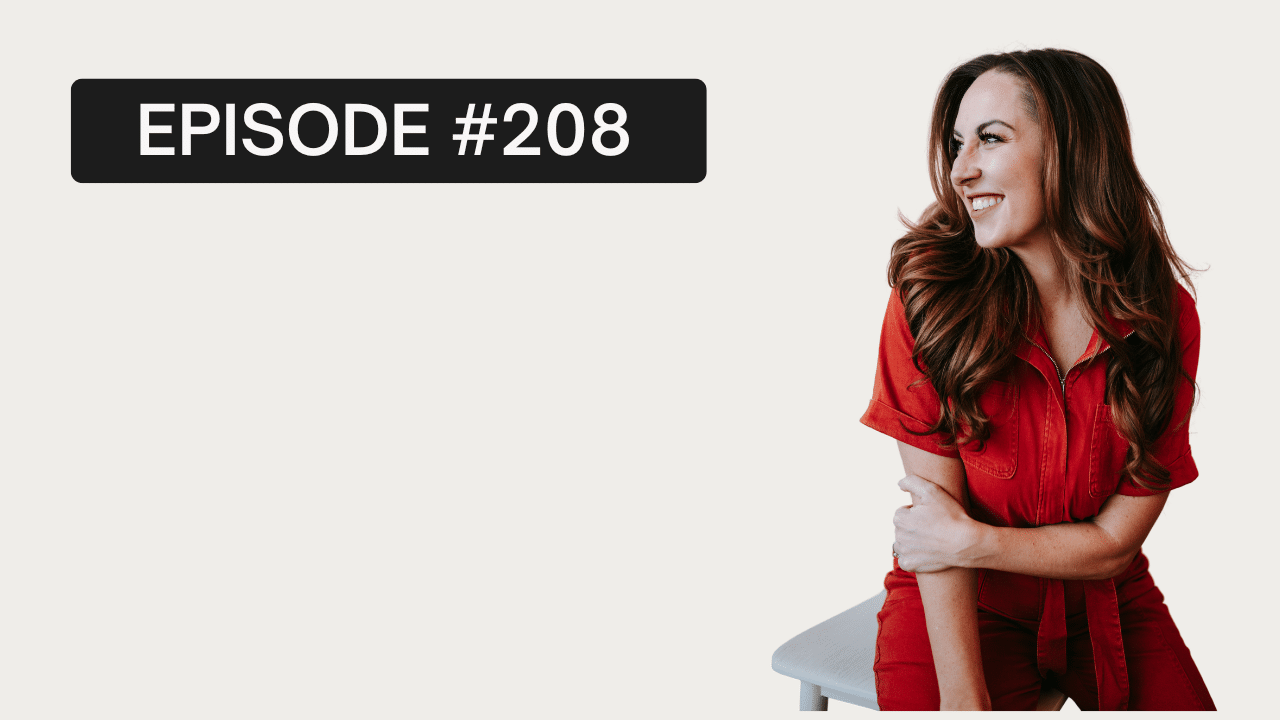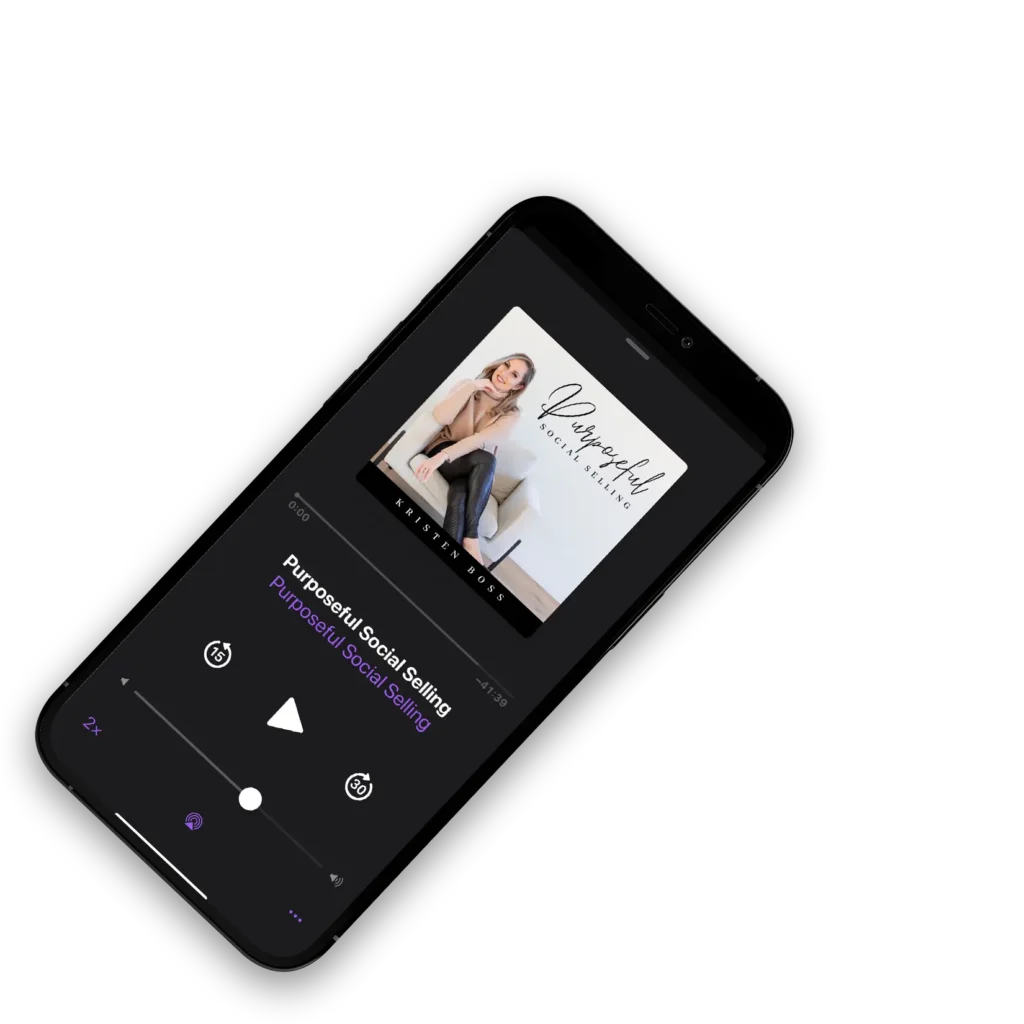Many of us constantly struggle to balance self-acceptance and self-improvement in a world flooded with body standards, diet culture, and societal pressures. The battle between body positivity and the idea of hustling for a better version of ourselves can be a sensitive and complex one. Today’s episode is an invitation to Kristen’s journey and how you might be thinking about these two philosophies.
Let’s look at a few highlights:
- Kristen shares how the endless chase for an ideal body meant she often neglected her actual health needs.
- The insidious diet culture had her trapped in a cycle of self-loathing. She was led to believe that loving yourself meant staying stagnant, and any desire to change was an act of self-hate.
- Body positivity is not a free pass to neglect one’s health.
- Anti-hustle is not an escape from hard work.
- Acknowledging that just because something feels uncomfortable doesn’t mean it’s hustle, and we can’t walk away. In any endeavor, if you want to build something sustainable, you will have to work hard.
Balancing these philosophies means recognizing that we can treasure our bodies and self-worth while striving for improvement. It’s a journey of discovering that loving oneself should never be an excuse for complacency. That hard work is often the path to a healthier, happier, more authentic life. So, let’s look at our habits, address the areas where we’ve made excuses, and make the changes necessary to achieve actual, sustainable results.
Introducing the Social Selling Leadership School: A 12-week Advanced Leadership Certification program for Network Marketers. This program was designed to give you everything you need to be a confident and transformational coach for the people you serve and help your team get massive results. This is the ONLY Coaching Certification program built specifically for the social selling market. Find out more and join the waitlist here!.
Thanks for listening! Do you have a question about network marketing? Kristen can help! Drop your question here, and she just might answer it live on the podcast: https:/Kristenboss.com/question
If you’re ready to learn the simple process of running your social selling business online, you have to check out Kristen’s live group coaching program! The Social Selling Academy: www.thesocialsellingacademy.com
Transcript for Episode #186: Body Positivity + Anti-Hustle
Kristen Boss (00:03): I see you with brand new eyes. No, I’ve never been so sure. Take my, you are listening to the Kristen Bos podcast. I’m your host, Kristen Bos. As a bestselling author and performance coach, I’m on a mission to share about sustainable and purposeful approaches to both business and life. Each week, I bring relevant topics that I believe are necessary to create a life of purpose, significance and meaning. Entrepreneurship is about so much more than growing your bottom line. It’s about who you are becoming in the process and building a life that is truly extraordinary. Entrepreneurship is really just the beginning.
Kristen Boss (00:57): Hey, bosses. Welcome to another episode of the podcast this week. Ooh, it’s going to be a doozy. I’m actually kind of nervous recording this podcast. I know I might be poking some sensitive areas today, but I want to kind of offset that or say before we really get into it. Today is this is from my own journey, my own experience, and this is meant to just invite some insight and some honest reflection about how you might hold to different philosophies, and I’m talking about anti hustles and body positivity. If you have listened to my prior podcast episodes, I had one, maybe I did a little over a year ago that was about hustle culture and diet culture and how they were the same. I still stand by that. However, now we’re going to sit on the other side of the pendulum on how I believe body positivity and anti hussle have a lot of similarities and how it comes from a good and positive place, but when misunderstood, when misapplied, it actually causes more harm than good.
Kristen Boss (02:13): So if you are, I’m also going to say this too, I’m also going to put a disclaimer in there. If you are also in your own journey, and maybe you are overcoming a history of disordered eating and you are healing with some of those things, this might not be the episode for you because I am going to be talking about weight loss from a healthy place of self-care. So that’s just my little disclaimer. Just know yourself, bring your self-awareness into this. But I want to talk to the person who has fallen down, maybe embrace one or both of these philosophies. But I can tell you I was specifically guilty with being swallowed up by body positive culture. Now, it came at a good
Kristen Boss (02:59): And from the right place. I was the person who was always chasing diets. If there was a fast fix and there was a button for it, a pill for it, a shake for it, a fasting plan for it, I bought it every single time. So I was always looking for fast fixes. And I think part of that was just us millennials. We grew up in, I’m going to call it the slim fast culture, the Special K diet, culture, all of those things. So I really did have to go on a journey about my relationship with myself, with food, with eating, even with exercise, and a lot of that had to be reclaimed. But I think in part of that journey is in an effort to distance myself from harmful dieting practices that I had gone into in my youth. And honestly up to my early thirties, for most of my life was shaped that way.
Kristen Boss (03:58): It was very, I would do 90 day things, I would restrict my calories, and then I’d binge and I would catch up on all the eating that I missed out on. So it definitely came from a place of needing to heal certain areas when it came to health, fitness, and food. So I do think part of my healing process with leaving diet culture was there was refreshment for me in the body positive movement where I had to learn to see exercise and movement as a form of self-care. I had to understand nourishment. I had to understand my relationship with food. I had to stop using self-loathing as a primary motivator to get to the gym. And that was the motive. The motive was like, oh, I’m filled with self disgust and loathing, and that was usually the fuel that would get me going. And noticing that’s not kindness, that’s not love, that’s not gracious.
Kristen Boss (05:06): So in my body, positive journey, I also got to the place where I was like, I would say I became overly permissive with myself where I was give myself grace and covid was stressful and listen to your body. Well, I kept listening to cravings. I listened to like, Ooh, ice cream sounds really good. A margarita sounds good. Ooh, that sounds good. And it became overly permissive eating in the name of like, this is self-care. And it became a distorted view of originally what it was supposed to be for me, which was a healing journey. And I ended up coping in the wrong way. So I ended up this idea of just size up and have compassion for yourself. Well, I kept sizing up like, oh, size up my genes and love myself the way I am. So in that healing did happen. But then it got to the point where I followed it so much where healing became self-harming in a different way.
Kristen Boss (06:14): I saw the self-harm that came with diet culture, and now I was self-harming under the guise of body positivity, self-harming by eating my feelings, not learning proper stress management, my body being inflamed, not sleeping well, all those things. And so that’s when I realized, wait, hold, and my mind started to get distorted because that’s all I followed. I followed body positive accounts, and I followed nutritionists and intuitive eaters, but realizing that those intuitive eating specialists, they have programs that they sell, and so they have certain philosophies, but I wasn’t able to filter my own experiences knowing that they’re selling something, they have a business and therefore they’re selling their philosophy. But I just assumed their philosophy had to be mine. And so I would hear things like, oh, counting calories or counting macros is disordered. It’s wrong. So I was like, oh, I can’t count calories because I don’t want to be disordered with my eating.
Kristen Boss (07:12): Or I would just say, I would see other accounts that said, shrinking your body is wrong. Trying to lose weight is wrong. So then I was in this place where I’m like, oh, I guess if I want to lose weight, then that means I don’t love myself and it means I can’t accept myself the way I am. So it’s like I was in this very confused, stuck place where I’m like, wait, hold on if I’m over here in diet culture, but if I’m over here, I’m told to size up, eat what I want, listen to my body, but it was through a distorted lens and I had gained 30 pounds, and I was really unhappy with that, unhappy in my body. I was uncomfortable, and I felt like body positive culture was saying, this is how you have to be and you need to be happy with that.
Kristen Boss (07:58): Even though I’m like, but I’m not comfortable in my body. Physically, I was not comfortable. So I say that because it had warped my view where I had to actually find the middle ground between the two and be like, well, wait, hold on. What does body positivity actually mean to me? And it has since shifted where it’s no longer because I think my body positivity had very carefully and quietly slipped into body apathy. It’s fine, I won’t work out. It’s okay. I’ll sit on my butt, eat what I want. It became lower quality. I would self-care with food and not the most nourishing food and food that would leave me tired or inflamed or groggy and not feeling my best. And so it became, instead of nourishing my body, I was neglecting it, but I was misunderstanding what was happening. So all that to say is in my health journey, first I had to give myself permission to see that being body positive meant taking care of my body in every way possible.
Kristen Boss (09:08): Meaning, can I give it nourishing foods that satisfy me for longer than three hours? Am I giving myself greens and protein and vegetables, or am I giving into every indulgence or craving or am I emotionally eating? I had to learn that I had developed a coping mechanism for seeking comfort in food. Again, I’m not go here to present myself as a health expert. I’m just sharing from my experience because I’m going to tie it into anti hussle and what I see people doing as well. Maybe you’re already seeing the similarities here. So I had to give myself permission to want to lose the weight and not make myself wrong for and not mean, it was because I didn’t love myself. It was more so I’m going to prioritize movement and weight training and portion control and fueling my body because I love it. Where diet culture had me, the primary motivator was self-loathing, and that’s when I actually learned that my reclaimed body positivity, really understanding the message was using self-love as the motivator to take care of myself in the best way possible through weight training, through steps, through accounting, my macros and accounting.
Kristen Boss (10:34): My macros was just to help me understand what I was actually putting in my mouth, because I’m going to have my coach on the podcast at some point just so great. And there have been studies that show that women typically underreport their food intake or they underestimate it by as much as 40%. And so I was thinking like, oh, I don’t eat that much, but I was snacking a lot, drinking my calories, and so I was undernourished and overfed at the same time, and so I had to really, and I had to stop following the body positivity accounts, not because I believed they were doing anything wrong or not because I disagreed with the messages, because I had to figure out what that looks like for me now. Okay, if I want to lose these 30 pounds because I feel better, and I’m also on stages, and I noticed my heels were standing in heels was way less comfortable. There was just physical things. I noticed I live in the mountains and we ski and going up and down stairs in my house, and so I was like, I want more energy. I want to feel better. So I had to give myself permission to want to lose weight and not make that mean that I was being vain, that I was buying into standardized beauty. I had
Kristen Boss (11:53): To work through all of that because I had so deeply indoctrinated myself with body positive culture, thinking, wanting weight loss at all was wrong and that I had to be happy with where I was. Now, I took some of the principles with me in my wellness journey, and I learned to love myself as I was also changing. So instead of, again, instead of using self-loathing or disgust as ew, I just can’t stand the way I look or the way I feel, I’m going to go to the gym that’s not from a place of self-love. Instead of I’m going to care for myself enough to prioritize movement today because I know it. It helps me sleep better. It gives me a clear mind and it gets me closer to my goals. I want to become somebody who keeps her promises to herself. I just found all those other reasons.
Kristen Boss (12:40): And so I also, as I was moving along in my journey, I learned to love myself in the process, not just love myself at the end goal of like, oh, I’ll like myself more when I lose 20 pounds. It was like, no, I’m going to like myself right now and I’m going to go to the gym. I’m going to like myself now and I’m going to love myself now, and I’m still going to choose to take care of myself. Instead of, I was just using, to be completely honest with you, I was using body positivity as an excuse for me to indulge to overindulge in food and to use food as a coping mechanism to frankly be lazy. And so I saw that, and then I’ll never forget one day when I was like, wait, hold on. This is what happened with anti Hussle. We have a misunderstanding of what the anti hussle philosophy actually is.
Kristen Boss (13:36): I think it’s interesting because I wrote a book about it and I came aloud to the marketplace with this in 20 19, 20 20, and a lot of people were like, yeah, anti hussle, and it’s from a place that people were experiencing burnout. However, at some point the message got distorted because again, I was talking about with wanting to change your physique, wanting to be healthy, what is the fuel? Well, diet culture, for me, the false fuel, the fuel that wasn’t from a place of love was self-loathing and disgust. Taking care of myself was like, okay, the fuel became like, because I love myself, I’m going to take care of myself better. With the anti hustles movement, you have to look at the fuel. The fuel of hustle is the posture of scarcity. It’s like I have to survive. It’s a very scarce posture, whereas anti hussle, it should be about, the fuel feels different, like you’re moving from a place of service and abundance and gratitude, how somewhere along the line it got distorted where I started noticing people were using the anti hussle philosophy as an excuse to get out of things whenever it felt hard, whenever it was time for it to be gritty and hard in their business, there was like, well, ooh, that sounds like hustle.
Kristen Boss 14:55): Well, it’s like, wait, wait, hold on. Why is that hustle? Are we just assigning the label to that just to get out of what feels uncomfortable? Just because it feels uncomfortable doesn’t mean you get to label it as hustle and walk away and say, well, I am just working from a different place and expecting the results to still show up. You still have to put in the really hard work. But somewhere along the way, Andy Hussle became this permissive place to get out of anything that felt hard. We started assigning hustle to hard things, and we have done ourself a disservice because when people started being like, well, oh, that sounds like hustle. They took themselves out of the work and their paycheck started to suffer. Their businesses started to suffer, and so what the hustle, the anti hussle philosophy is about, it’s not about the work.
Kristen Boss 15:47): The work is the same. It’s who you are being in the work, but a lot of people looked at the work and they’re like, that’s hustle instead of, no, no, no, no. It’s who you are. Being in the work, in your doing of the work. Hustle is a very hurried, anxious, scarce, freaked out, yeah, scarce place, believing the resources are all about to go away, and it’s a very anxious energy. There’s lack of boundaries, there’s lack of clarity or focus of where you’re going. Your hair is on fire, whereas anti hussle is you are focused. You have a big vision, you have boundaries around your work. You know how to work productively and not just busy. Scarcity is not the fuel. It’s about service and working with grit and purpose. Purpose is the fuel, and that’s what the book was about. But there’s been some sort of collective mindset I’m seeing where people are started to check out, started to check out of the hard, and maybe that was you.
Kristen Boss (16:50): Maybe you realize that’s exactly what I’ve been doing. I viewed anything that was hard as hustle instead of who I was being in the work, because I will tell you, there’s no way for you to build a life and a legacy and really change your financial trajectory for your family without hard work. Hard is a part of the equation. If you’re looking for easy, it’s sleazy, easy is sleazy friends, and if you’re looking for a shortcut, it’s not going to last. If you want to really build something sustainable, then you’re going to have to put in the work, and there are going to be seasons where you’re going to have to push hard, and some of you might be like, you might hear the word push and be like, what do you mean by that? Does that mean I’m not going to see my family?
Kristen Boss (17:36): No, they’re just going to be seasons where you might have to work harder and longer than other seasons where there might be seasons. You have to wake up early for a quarter of the year where you’re like, okay, this is what I need to do and I need to have a plan. I need to be more proactive. I need to be more strategic with my time. Sometimes people think like, oh, I need to give up more. I’d be like, no, maybe you just need to have a better plan or be more strategic with how you’re working your business, and maybe there’s going to be a season where you give up tv, but it’s not forever, and we have to look at that. We have to look at, okay, what is the short-term play here where I might need to push for a little bit and then I need to move into a recovery, not where I’m taking my foot off the gas and I’m not working my business anymore.
Kristen Boss (18:18): That is not what I’m talking about. Because if you’re at that place where you feel like you need to disappear from your business every 30 days, I would say there’s something about your business and how you’re operating that’s not sustainable. So if you’re taking a break every two weeks, every month where you’re recovering from the end of month, I’d be like, how are you working in such a way where you feel like you need to take a break from your business the first two weeks of the month? How can you work more sustainably so that you have the gas pedal just down all month long and the month end isn’t like this crazy catch up hair on fire, and it does take some intention and some strategy, and it does take doing things differently. So I’d be curious. I want you to ask yourself, in what areas have you maybe misunderstood the anti hussle philosophy and used it as an excuse to get out of the hard, used it as a way to be like, oh, anything that feels uncomfortable, anything that requires me to go outside of my comfort zone that’s hustle and I don’t do hustle.
Kristen Boss (19:18): I would say, you don’t understand what hustle is then because it’s not the work. It’s the energy around the work. You could say, if someone was to say to you, let me give you an example, because sometimes I’ve had students say this where they’re like, oh, my upline challenge just to send 30 messages a day, and that just sounds like hustle, so I’m not doing it, and it’s this very black and white thinking. I’d be like, wait, why are you throwing the baby out with the bathwater and why are you making that mean? It’s hustle?
Kristen Boss (19:52): So what they do is they assign, that’s hustle. They throw it all out, and then they do nothing. Instead of, okay, then I would ask, well, what are you willing to do? What are you willing to put into this? Are you willing to connect with five to 10 new leads a day? If not, why not? We have to dig that up, but oftentimes we hear, or I hear people faulting their uplines like, oh, my upline is so hussy, and therefore any suggestion they give me, I just disregard. I’m like, well, is that fair? Or are you just looking for an excuse to get out of the hard work? Is there some merit or some legitimacy to what they are encouraging you to do? Or maybe you need to ask yourself, okay, if I’m not willing to do that, what am I willing to do? What actually moves the needle forward in my business?
Kristen Boss (20:36): And some of you don’t actually, it blows my mind, but some of you don’t actually know what moves the needle forward in your business every day. If I was to say, what moves the needle forward in your business, what comes to mind? Would you be making a post? I would actually say no. Yes, that’s important, but the number one most important needle moving activity you can do in your business is being in conversations, networking, talking to people, because guess what? If you make a post and you are not talking to anybody, guess who sees your post? Only your sideline, your friends, people in your company, no one that you’re actually trying to get in front of a network with the least social you are on social media. The less you will be seen on social media and visibility is king. And some of you can fight me on this all day and be like, oh, you’re so stuck in your nostalgia of how social media used to be that you’re still fighting.
Kristen Boss 21:33): You’re fighting how it is now. You’re like, yeah, but I don’t want to, and I just want things to go back. I’m like, okay, you could sit here and fight this and let your paycheck continue to stall or dwindle, or you can get with the times and say, alright, it’s uncomfortable. It’s frustrating, it’s hard. It feels foreign to me, but what other choice do I have? I was coaching somebody in the academy recently, and it was this older gentleman, and he was really feeling like, he’s like, I really feel like I need to grow my paycheck. And I was like, well, how’s it going? The problem was he wasn’t building an audience and he wasn’t intentionally networking with the right people, so he was making offers, but nobody was biting. Nobody was jumping in the business with him, and he’s like, I don’t really want to take the time to build an audience.
Kristen Boss (22:23): And I told him, I said, well, what other choice do you have? Because you can keep doing what you’re doing and you have evidence that it doesn’t work, so what other choice do you have? And it was so funny. You can tell he hadn’t thought about that before. He was like, good point. I don’t really have a choice. I either stay exactly where I’m at, or I get on board and I have to put my time into this. So I’m going to ask you this. What areas are you resisting in your business and your personal life where maybe you are assigning hustle to that being like, nah, that seems kind of hussy. I’m not about that. Or, Ooh, that seems kind of sleazy. Is it sleazy or is it uncomfortable? The difference not, I see a lot of people, they’re like, oh, but I don’t want to be scammy.
Kristen Boss (23:12): I’m like, define scammy for me. Are you actually going to go and pedal a scam then? Don’t do that. Are you going to go and say something misleading? That’s not true. Yeah, don’t do that. That would be scammy. But sometimes people just assign, I am uncomfortable, or I’m talking to people and therefore that’s scammy. I’d be like, no, you’re just being a person. Let’s stop assigning gross and scammy with selling and making them synonymous. They’re not the same. Selling isn’t scamming. Can scamming happen with selling? Yes, but selling in and of itself is not scammy. It’s not gross, it’s not slimy, and it’s important that you do that work because I notice when people are like, oh, I just don’t want to be slimy and salesy and scammy, I’d be like, okay, define that for me. They’d be like, and when we really get down to it, they just don’t want to sell.
Kristen Boss (24:08): I’d be like, well, why are you in this business model? Because let’s just get honest with this. Let’s just own what this is. You are in a business that involves selling, it involves transactions, but you are also in a relational business model, and you do have to be somebody who is good at relationships, not misusing them and abusing them, but I mean, being a relational person who also sells products, and that’s not wrong. So I just find it funny when I ask people, I’m like, what does scammy mean? At the end of the day, they’re just defining sales. I’m like, oh, so you don’t like sales? No, why? They’re like, well, I don’t want to take advantage of people. I’m like, why would you be taking advantage of people? Do you not believe they have free will? And they can’t tell you no? What are you afraid of them experiencing?
Kristen Boss (24:56): Do you plan on bullying them? Do you plan on chasing them? Do you plan on being that person that’s like, we’ve been trying to reach you for your car’s extended warranty. That’s not who you’re, but actually that’s how some people show up in this business. It’s kind of embarrassing for all of us, so don’t be that person. But all that to say, friends, where are you looking for an excuse to get out of the work? Where are you looking for an excuse to letting yourself off the hook of habits that you know should be forming that gives you the results you want in your life, whether it’s with your health or your business? Be onto yourself. Look for, Ooh, where are things that I have been kind of sneaky with myself just to get out of the work that as soon as I think that or believe that I know I let myself off the hook? And when you can be really honest with yourself, then you can actually start looking at your habits, looking at the areas you’ve been making excuses and make real changes. And when you make real changes, you get real results. We’ll catch you in the next episode.
Kristen Boss (26:04): That’s a wrap for today’s episode. Listen, if you love what you heard here today, I would love for you to leave a real quick rating and a review. This helps the show get discovered by new people. Be sure to take a screenshot of today’s episode and shout us out on Instagram. We’ll shout you right back out. If you’d like to find additional resources or discover how to work with me, head to kristenboss.com. It starts right.
